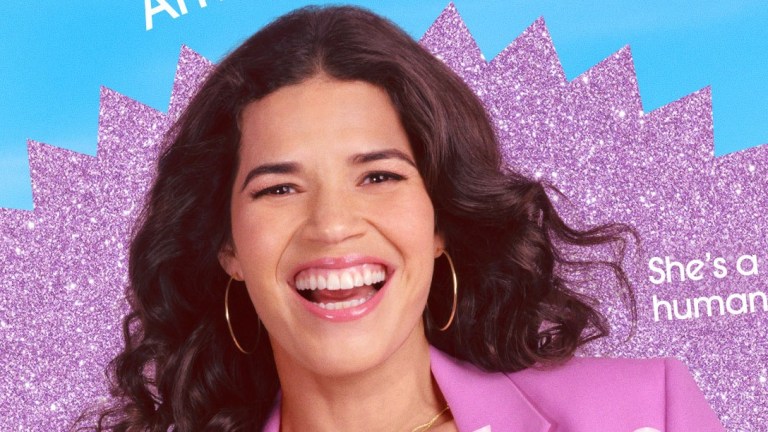America Ferrera’s Barbie Speech Continues Greta Gerwig’s Conversation with Women
America Ferrera's monologue in Barbie was a breathtaking moment for millions of moviegoers, and it is in dialogue with the last time Greta Gerwig used icons of girlhood to say something profound about being a woman: Little Women.

Even before I saw Greta Gerwig’s Barbie, I knew to expect a big moment. I’d glimpsed excerpts from America Ferrera’s monologue, condensed into tweet form and pasted onto pink Instagram slides. Even as I tried to stay “unspoiled” on the words themselves before I got to the film during its first week of Barbie’s release, I knew that at a pivotal point in the film there would be this show-stopping speech. Thankfully, expecting it did little to dampen how moving it was in the moment.
As Stereotypical Barbie (Margot Robbie) is reeling from an existential crisis, and about to give up on saving the patriarchy-poisoned Barbie Land because she no longer feels like the epitome of female perfection, it’s the Real World’s Gloria (Ferrera) who provides the most unexpected pep talk—by revealing to Barbie that perfection is not just unattainable, but is an insidious trap for women.
“It is literally impossible to be a woman,” Gloria tells a tear-stained Barbie, her own voice cracking with emotion. “You are so beautiful and so smart, and it kills me that you don’t think you’re good enough. Like we have to always be extraordinary, but somehow we’re always doing it wrong.”
She lists the seemingly endless contradictions: “You have to say you want to be healthy, but also you have to be thin.” “You have to be a boss, but you can’t be mean.” And the most damning one: “But always stand out and always be grateful.” By trying to be everything, women stop themselves from ever achieving true happiness or change.
It’s the kind of message that breathlessly grabs your attention in the theater but feels rather on-the-nose once you’re talking about it outside of that space, like the only response can be a sardonic Now tell me something I don’t know! Yet when I took a beat and thought about all the little girls and boys watching this movie, Gloria’s diatribe is a revelation. (And how interesting that I hesitated to use words like diatribe, or tirade, as they all have such negative, shrewish connotations, even if their objective definitions are of bitter criticism, which is nothing but accurate.)
While Gloria’s monologue could only do so much in the context of Barbie, what I loved best about it was how it felt like a continuation of the conversation that Greta Gerwig started in Little Women, her 2019 adaptation of Louisa May Alcott’s formative novel. Before she was deconstructing Mattel’s IP, Gerwig was playing with dolls with this quartet of classic female characters.
Like Barbie, the March sisters have become their own archetypes for girls trying on different roles in adulthood: Meg, the wife and mother; Jo, the artist who “sells out” while resisting marriage; Beth, the tragic martyr; and Amy, the artist who seemingly gets everything she wants. Also like Stereotypical Barbie and her fellow citizens of Barbie Land, there’s the temptation to declare these roles mutually exclusive.
Reading Little Women, we girls had a tendency to pick one March sister and pin our entire identity upon her, as if once we picked up one doll we could never exchange her for another. (Yours truly has always most wanted to be Jo, even if I lack her pluck.) But what Gerwig accomplished with 2019’s Little Women was to reveal how much each of the sisters’ identities actually bleed into one another’s. Take Meg, who delights in acting in Jo’s plays, and she appreciates the culture of society parties, donning a nickname bestowed by another girl along with a borrowed dress. Her choice to prioritize the domestic life is at first more about taking on yet another role, imagining an idealized future; her emotional journey in the film is about accepting the realities of married life, which is less about new clothes and more about appreciating each year they continue to be alive.
Even more impressive is how Gerwig links Jo and Amy, the antagonistic sisters who seem to spend their lives competing over Aunt March’s attentions (and artistic support) as well as Laurie’s affections (and, let’s be real, financial support). While we were all waiting for Jo’s expected big moment later in the film, Amy’s (Florence Pugh) monologue comes first, and nearly blindsides us: Having studied in Rome and Paris and thus determined that she is of “middling talent” as a painter compared to Jo making a living as a writer in New York, she has decided that her only option is to marry rich. When Laurie (Timothée Chalamet) criticizes her for what he interprets as shallow social-climbing, she firmly puts him in his place:
“Well. I’m not a poet, I’m just a woman. And as a woman, I have no way to make money, not enough to earn a living and support my family. Even if I had my own money, which I don’t, it would belong to my husband the minute we were married. If we had children, they would belong to him, not me. They would be his property. So don’t sit there and tell me that marriage isn’t an economic proposition, because it is. It may not be for you but it most certainly is for me.”
Amy March, who I had always disregarded as the spoiled baby of the family, is in many ways the most pragmatic and clear-eyed of the March sisters. By contrast, when Jo (Saoirse Ronan) has her own quotable moment later in the film, it’s from a place of heartbreak and utter loneliness, as she cries to Marmee (Laura Dern), “Women have minds and souls as well as hearts, ambition and talent as well as beauty, and I’m sick of being told that love is all a woman is fit for.”
Gerwig’s screenplay includes the stage direction (so to speak) of Jo “trying to explain herself to herself.” Barbie takes on that same existential burden, but splits it between two women. While Robbie’s self-aware doll initially relishes her role as the Ur-Barbie, she becomes increasingly disillusioned with her role within both Barbie Land and the real world. She laments that she can’t be president or heal people, or create something new. She’s meant to represent an ideal, but she’s also never supposed to change.
In that moment the roles reverse, as Gloria—who had played with this doll, had looked to her for stability and meaning—becomes the role model. She’s a wife (with an adoring husband who sweetly uses Duolingo to learn Spanish) and a mother, but she’s also an executive assistant with a penchant for designing break-the-mold Barbies, and before this life she dated at least one speed demon. Her life is far from perfect, but she embodies contradictions and possibilities, and, most crucially, the opportunity for change.
The very best part of Little Women is when Jo savvily sells the commercially appealing happy ending to her novel without necessarily promising that her real life will fit the same neat mold. Repeating Amy’s words about marriage being an economic proposition, she agrees to “sell my heroine into marriage for money”—but when we see Jo acting out the domestic ending that all Little Women readers know, it is marked in the script as FICTION(?), leaving the resolution open to audience interpretation. Are we seeing the creator’s real fate or are we still playing with her literary creation like she’s a doll?
Like Jo, Barbie grapples with reconciling the idea versus the reality. Even after restoring Barbie Land to its former feminist utopia form—with some room for Barbies to expand their identities beyond their singular marketed roles—it’s not enough for Stereotypical Barbie to return to being an unchanging constant. Just as Jo’s big moment builds on the foundation of Amy’s own quiet tirade, Gloria’s cheer-inducing monologue tees up Barbie’s own speech to create the moment that truly moved me to outright sobbing. She wants to transcend being a fixed idea and explore the messy reality of womanhood, every contradiction and misstep that Gloria described: life, and its inverse of death. Play in the name of change, but with an ultimate ending to the game.
Gloria makes you pay attention to the rules of womanhood being rigged, but Barbie herself makes you realize that engaging with those rules, and perhaps changing them in some small way for the next generation of women, is the true ideal existence.

